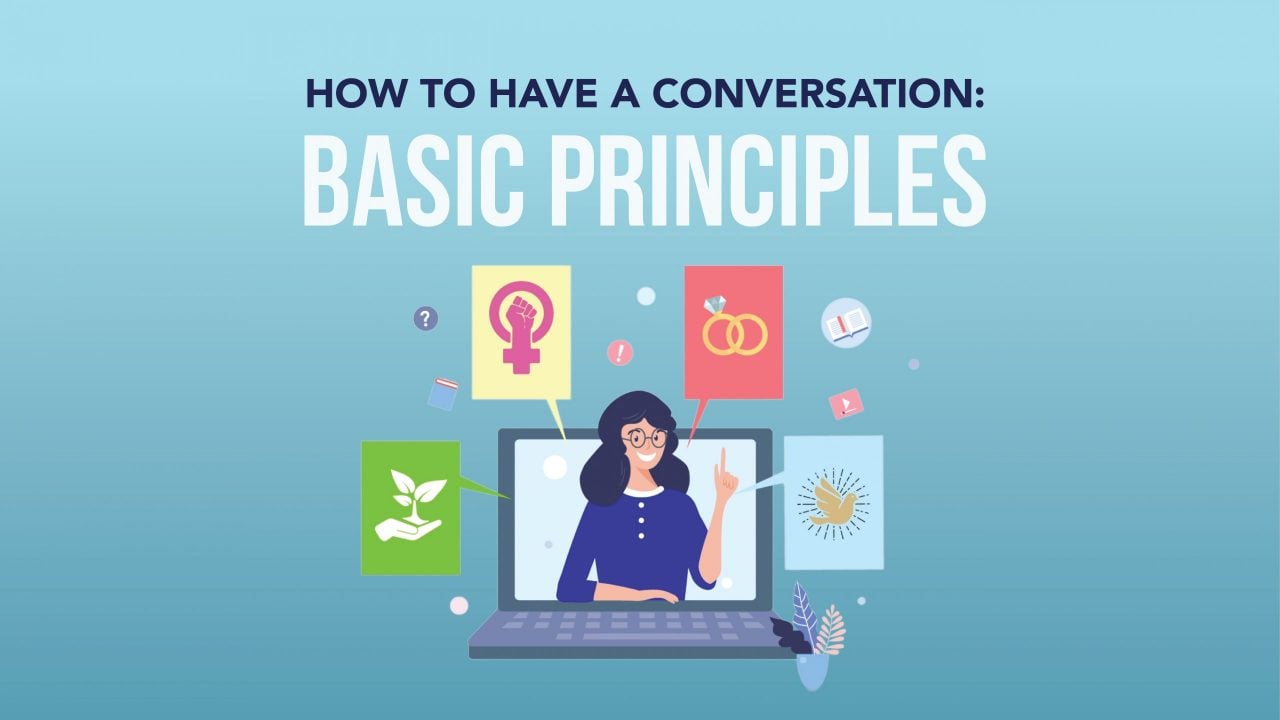You’re in a conversation and someone keeps interrupting you or you’re in a conversation and someone complains it’s bigoted to think that Jesus is the only way to God or you’re in a conversation, and someone says, “You’re a Christian because you live in America. If you lived in Iran, you’d be a Muslim.”
What would you say?
Here’s some other tips to help you handle difficult circumstances you may run into as a follower of Christ.
1. When someone keeps interrupting you, stop them gently and ask for equal time.
2. When someone raises an issue that Jesus himself has spoken about, enlist him as your ally.
3. When someone challenges Christianity based on something about you, ask “So what?”
Thanks to Greg Koukl for his contributions to this video. Greg is the Founder and President of Stand to Reason. You can learn more by visiting https://www.str.org/
You're in a conversation and someone keeps interrupting you or you're in a conversation and someone complains it's bigoted to think that Jesus is the only way to God or you're in a conversation, and someone says, “You're a Christian because you live in America. If you lived in Iran, you'd be a Muslim.” What would you say? In our previous videos on how to have a conversation, I walked you through how to use questions when talking to your friends, family, or strangers about hard topics. Here's some other tips to help you handle difficult circumstances you may run into as a follower of Christ. Number one: When someone keeps interrupting you, stop them gently and ask for equal time. This person that interrupts a lot I call a steamroller and they're very, very hard to deal with because they are usually people with very strong personalities, and they're not interested in hearing your view, and every time you start to respond, maybe to a challenge that they offer, they jump in and they take you in a new direction. And so you try to respond to that and they interrupt again, and they take you in another direction. What you have to do is not follow their lead. Instead you pause, maybe use a little bit of body English and say, “hold on just a minute. I'm not quite finished. Is it okay with you if I have a few more moments to answer your challenge, and then I'll let you jump in?” You want to wait and get their response, because if you don't do it, you're going to be sunk. You ask for equal time. If they don't give you equal time by continuing to interrupt, this is when you just simply have to break off the conversation. Steamrollers are tough characters. If you can't manage them, you will get nowhere. Stop them, encourage them to give you equal time or leave them. Number two: When someone raises an issue that Jesus himself has spoken about, enlist him as your ally. Now I call this tactic “What a Friend We Have in Jesus.” And I'll tell you why, because people respect Jesus, generally speaking, but they don't necessarily respect Christians. So if somebody challenges me for example, by saying, “well, you're a bigot because you think Jesus is the only way to God.” My response is going to be “Well, you know what? I may not even like that idea either, but the point is, this is Jesus' view. It's not just my view.” Now, what have we done now? Now we've made Jesus our ally and the person who argues with us now is arguing with Jesus. And that's exactly right where we want it. If someone asks you, “what do you think of same-sex marriage?” You can say, “well, I have the same view about marriage that Jesus had.” “What's that?” “Well, you can find it in Matthew 19. Basically Jesus said, marriage is one man with one woman becoming one flesh for one lifetime. That's my view too.” Notice that you've now pitted them, not against you, but against Jesus. That's “What a Friend we have in Jesus.” Number three: When someone challenges Christianity based on something about you, ask “So what?” Here's what I mean, there are a lot of challenges against Christianity that are based on the circumstances of some individual Christian, you or someone else, but have nothing to do with whether or not Christianity is true. So when somebody says, for example, that you're a Christian because you were born in America, but if you were born in Iran, you'd be a Muslim. My response is “Sure. Maybe. So what?” in other words, what does that have to do with whether or not Christianity is true? It doesn't have anything to do with it. Frankly, if the atheist who asked the question was born in Iran, he wouldn't be an atheist either. This kind of question gets you nowhere. When people offer challenges to Christianity, based on the circumstances of the Christian: “Christians are stupid,” “Christians are hypocrites,” “Christians are this, that, and the other thing.” Why not just simply say “Okay,” for the sake of argument and then ask “So what? what does that tell you about the truth of Christianity itself? Jesus, rising from the dead, the work of the cross, any of that?” It tells you nothing. You go nowhere. That's why “So what?” is a great question. So the next time you encounter one of these scenarios, here are the three tips to remember Number one: When someone keeps interrupting you, stop them gently and ask for equal time. Number two: When someone raises an issue that Jesus himself has spoken about, enlist him as your ally. And Number three: When someone challenges Christianity based on something about you, ask “So what?” One final thought: If you don't remember anything else I've said from this series, remember this: whenever you get in a tough situation, always ask questions. For What Would You Say? I'm Greg Koukle with stand to reason.
 Read More
Read More




